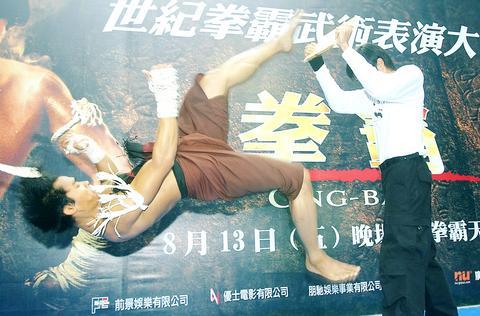It's natural with the hot weather to shed inhibitions and clothing. Singer Alex To (杜德偉) and his fans are no
exception.
For his latest album Take Off (脫掉), To not only makes a nude appearance in his music video, but he also invited his fans to do the same. On Sunday in a promotion for his new musical offering. To stripped to his shorts in Ximending. His record company advertised "half naked for half price, all naked for free" CDs, to encourage people to go on stage and strip with To. A few women took off their tops and presumably got half price CDs.

PHOTO: TAIPEI TIMES
"I look at myself in the mirror every night, naked, and make believe I'm 25. I can dance, sing, act, write songs and I'm good-looking!" said To (actual age, 42), adding he's proud of his iron-hard hard butt. According to The Great Daily News (大成報), however, To didn't just lose his clothes last week, he also lost his wallet and work permit in a taxi, causing a headache for his manager.
Thai action star Tony Jaa was another hot male body in action last weekend. In a promotion for his movie Ong Bak, Jaa gave Taiwanese reporters a first glimpse of his awesome Thai martial art powers. He somersaulted into the press conference and then practiced "kicks" at a 2m-tall colleague. It was all done so quickly the photographers present had to ask him to do it again, and again.
"I don't smoke, drink or have sex. I don't touch anything that's bad for the body. The most important thing for me is Thai boxing," the 28 year-old actor said. "The sacrifice is worth it." Whatever, Jaa is now back in Thailand to shoot the mega-budgetedTom Yum Goong, a story about saving an elephant from being abducted.

PHOTO: TAIPEI TIMES
Jackie Chan's (成龍) 22 year-old son Jaycee Chan (房祖明) is receiving recognition for his singing skills and dad will doubtless be chuffed. At the 6th CCTV-MTV Music Award Ceremony held last Saturday in Beijing, Chan Jr. took the award for Best Hong Kong New Performer. Never mind the fact that his record has not been released yet, and few people in China (let alone Taiwan)) have ever heard of his singing. Dad has clout, obviously. Jaycee Chan is also starring in the NT$320 million action thriller, Twins Effect II (千機變II花都大戰), in which his father is an investor.
"I don't want to rely on my father's connections in the entertainment field. In fact, I don't want people to mention his name in front of me," Chan was quoted as saying by Chinese media. Yeah, right.
In its second week of release, the negative reception to House of Flying Daggers (十面埋伏) is becoming a chorus of disapproval in the media and in Internet chatrooms in China, Hong Kong and Taiwan. In Beijing, film professor Su Mu (蘇牧) wrote an article slamming the film as "childish and ridiculous."
"Most of the audience was laughing in the theater and this expressed the contempt of the audience toward Chinese filmmakers," Su wrote. In Hong Kong well-known actor and director Michael Hui (許冠文) told Apple Daily (蘋果日報) that only one word could describe the movie ? "crap." In Taiwan, a movie Web site concluded, "Basically you can treat this movie as a comedy and laugh about it. But then again, NT$250 is better spent on more meaningful things."

March 10 to March 16 Although it failed to become popular, March of the Black Cats (烏貓進行曲) was the first Taiwanese record to have “pop song” printed on the label. Released in March 1929 under Eagle Records, a subsidiary of the Japanese-owned Columbia Records, the Hoklo (commonly known as Taiwanese) lyrics followed the traditional seven characters per verse of Taiwanese opera, but the instrumentation was Western, performed by Eagle’s in-house orchestra. The singer was entertainer Chiu-chan (秋蟾). In fact, a cover of a Xiamen folk song by Chiu-chan released around the same time, Plum Widow Missing Her Husband (雪梅思君), enjoyed more

Last week Elbridge Colby, US President Donald Trump’s nominee for under secretary of defense for policy, a key advisory position, said in his Senate confirmation hearing that Taiwan defense spending should be 10 percent of GDP “at least something in that ballpark, really focused on their defense.” He added: “So we need to properly incentivize them.” Much commentary focused on the 10 percent figure, and rightly so. Colby is not wrong in one respect — Taiwan does need to spend more. But the steady escalation in the proportion of GDP from 3 percent to 5 percent to 10 percent that advocates

From insomniacs to party-goers, doting couples, tired paramedics and Johannesburg’s golden youth, The Pantry, a petrol station doubling as a gourmet deli, has become unmissable on the nightlife scene of South Africa’s biggest city. Open 24 hours a day, the establishment which opened three years ago is a haven for revelers looking for a midnight snack to sober up after the bars and nightclubs close at 2am or 5am. “Believe me, we see it all here,” sighs a cashier. Before the curtains open on Johannesburg’s infamous party scene, the evening gets off to a gentle start. On a Friday at around 6pm,

A series of dramatic news items dropped last month that shed light on Chinese Communist Party (CCP) attitudes towards three candidates for last year’s presidential election: Taiwan People’s Party (TPP) founder Ko Wen-je (柯文哲), Terry Gou (郭台銘), founder of Hon Hai Precision Industry Co (鴻海精密), also known as Foxconn Technology Group (富士康科技集團), and New Taipei City Mayor Hou You-yi (侯友宜) of the Chinese Nationalist Party (KMT). It also revealed deep blue support for Ko and Gou from inside the KMT, how they interacted with the CCP and alleged election interference involving NT$100 million (US$3.05 million) or more raised by the